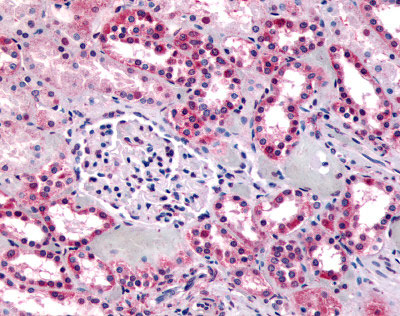SUCNR1 / GPR91 Antibody (C-Terminus)
Rabbit Polyclonal Antibody
- SPECIFICATION
- CITATIONS
- PROTOCOLS
- BACKGROUND

Application
| IHC-P |
|---|---|
| Primary Accession | Q9BXA5 |
| Reactivity | Human |
| Host | Rabbit |
| Clonality | Polyclonal |
| Calculated MW | 39kDa |
| Dilution | IHC-P (16 µg/ml) |
| Gene ID | 56670 |
|---|---|
| Other Names | Succinate receptor 1, G-protein coupled receptor 91, P2Y purinoceptor 1-like, SUCNR1, GPR91 |
| Target/Specificity | Human GPR91. BLAST analysis of the peptide immunogen showed no homology with other human proteins. |
| Reconstitution & Storage | Long term: -70°C; Short term: +4°C |
| Precautions | SUCNR1 / GPR91 Antibody (C-Terminus) is for research use only and not for use in diagnostic or therapeutic procedures. |
| Name | SUCNR1 (HGNC:4542) |
|---|---|
| Synonyms | GPR91 |
| Function | G protein-coupled receptor for succinate able to mediate signaling through Gq/GNAQ or Gi/GNAI second messengers depending on the cell type and the processes regulated (By similarity) (PubMed:15141213, PubMed:23770096, PubMed:34133934). Succinate-SUCNR1 signaling serves as a link between metabolic stress, inflammation and energy homeostasis (PubMed:18820681, PubMed:34133934). In macrophages, plays a range of immune-regulatory roles. During inflammation, succinate-SUCNR1 signaling may act as an anti-inflammatory mediator or boost inflammation depending on the inflammatory status of cells (By similarity). Hyperpolarizes M2 macrophages versus M1 phenotype through Gq signaling by regulating the transcription of genes involved in immune function (PubMed:34133934). In activated M1 macrophages, plays a pro-inflammatory role in response to LPS (By similarity). Expressed in dendritic cells, where it is involved in the sensing of immunological danger and enhances immunity. Mediates succinate triggered intracelleular calcium mobilization, induces migratory responses and acts in synergy with Toll-like receptor ligands for the production of proinflammatory cytokines as well as an enhancement of antigen-specific activation of helper T cells (PubMed:18820681). In the small intestine, mediates the activation of tuft cells by dietary succinate and triggers type 2 immunity (By similarity). In adipocytes, plays an important role in the control of energy metabolism. In response to succinate, controls leptin expression in an AMPK-JNK-CEBPA-dependent as well as circadian clock-regulated manner (By similarity). In muscle tissue, is expressed in non-muscle cells and coordinates muscle remodeling in response to the succinate produced during exercise training in a paracrine manner (By similarity). In retina, acts as a mediator of vessel growth during retinal development. In response to succinate, regulates the production of angiogenic factors, including VEGF, by retinal ganglion neurons (By similarity). |
| Cellular Location | Cell membrane; Multi-pass membrane protein |
| Tissue Location | Expressed specifically in kidney (PubMed:11273702). Highly expressed in immature dendritic cells, expression rapidly downregulates after maturation. Also expressed in macrophages (PubMed:18820681). |
| Volume | 50 µl |

Thousands of laboratories across the world have published research that depended on the performance of antibodies from Abcepta to advance their research. Check out links to articles that cite our products in major peer-reviewed journals, organized by research category.
info@abcepta.com, and receive a free "I Love Antibodies" mug.
Provided below are standard protocols that you may find useful for product applications.
Background
Receptor for succinate.
References
Wittenberger T.,et al.J. Mol. Biol. 307:799-813(2001).
Zhang W.,et al.Submitted (MAR-2000) to the EMBL/GenBank/DDBJ databases.
Kaighin V.A.,et al.Submitted (DEC-2007) to the EMBL/GenBank/DDBJ databases.
Ota T.,et al.Nat. Genet. 36:40-45(2004).
Muzny D.M.,et al.Nature 440:1194-1198(2006).
If you have used an Abcepta product and would like to share how it has performed, please click on the "Submit Review" button and provide the requested information. Our staff will examine and post your review and contact you if needed.
If you have any additional inquiries please email technical services at tech@abcepta.com.













 Foundational characteristics of cancer include proliferation, angiogenesis, migration, evasion of apoptosis, and cellular immortality. Find key markers for these cellular processes and antibodies to detect them.
Foundational characteristics of cancer include proliferation, angiogenesis, migration, evasion of apoptosis, and cellular immortality. Find key markers for these cellular processes and antibodies to detect them. The SUMOplot™ Analysis Program predicts and scores sumoylation sites in your protein. SUMOylation is a post-translational modification involved in various cellular processes, such as nuclear-cytosolic transport, transcriptional regulation, apoptosis, protein stability, response to stress, and progression through the cell cycle.
The SUMOplot™ Analysis Program predicts and scores sumoylation sites in your protein. SUMOylation is a post-translational modification involved in various cellular processes, such as nuclear-cytosolic transport, transcriptional regulation, apoptosis, protein stability, response to stress, and progression through the cell cycle. The Autophagy Receptor Motif Plotter predicts and scores autophagy receptor binding sites in your protein. Identifying proteins connected to this pathway is critical to understanding the role of autophagy in physiological as well as pathological processes such as development, differentiation, neurodegenerative diseases, stress, infection, and cancer.
The Autophagy Receptor Motif Plotter predicts and scores autophagy receptor binding sites in your protein. Identifying proteins connected to this pathway is critical to understanding the role of autophagy in physiological as well as pathological processes such as development, differentiation, neurodegenerative diseases, stress, infection, and cancer.


